Founded in 2006, CNEX aimed to put our motto into practice: “Looking for Chinese 2.0”.
In 2018, CNEX decided to do the screening event of 10 Years Documentary Films Showcase (CNEX 十年作品回顧系列), on the last Friday night of each month.
January 2018
All’s right with the world (2007)
Director : King-wai Cheung
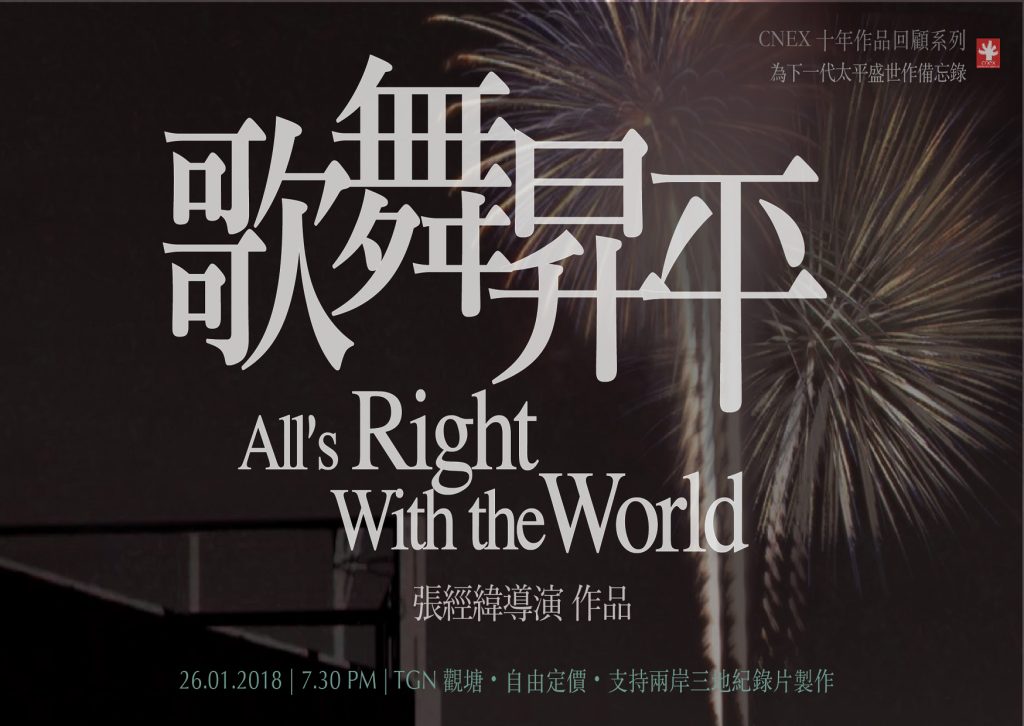
No country in the world is without poverty, capitalist or communist. Affluent Hong Kong is one of the largest financial centers around the world.
According to a 2006 research by the World Development and Economy Research Institute of UN University in Finland, 1% of the richest adults in the world own 40% of global wealth, while the poorer half of the global population merely owns 1% of total wealth. In Hong Kong, the wealth gap the 5th highest globally.
The strange thing is that Hong Kong has no local beggars, merely those bold beggars from the mainland. No one begs, not even an 80-year-old collecting cardboard. Only the mad begs for money. The poverty in Hong Kong is hidden and secretive, as if poverty is a shame. The government builds beautiful public buildings for low-income residents, with big gardens and stores, as if Hong Kong has no poor people. Does Hong Kong have poor people? Why is poverty not seen?
Peaceful and prosperous, this kind of surface richness doesn’t mean each Hong Kong residents has access to wealth.
So, what’s the life like for Hong Kong’s paupers?
February 2018
Flood (2008)
Director :Dong Jun
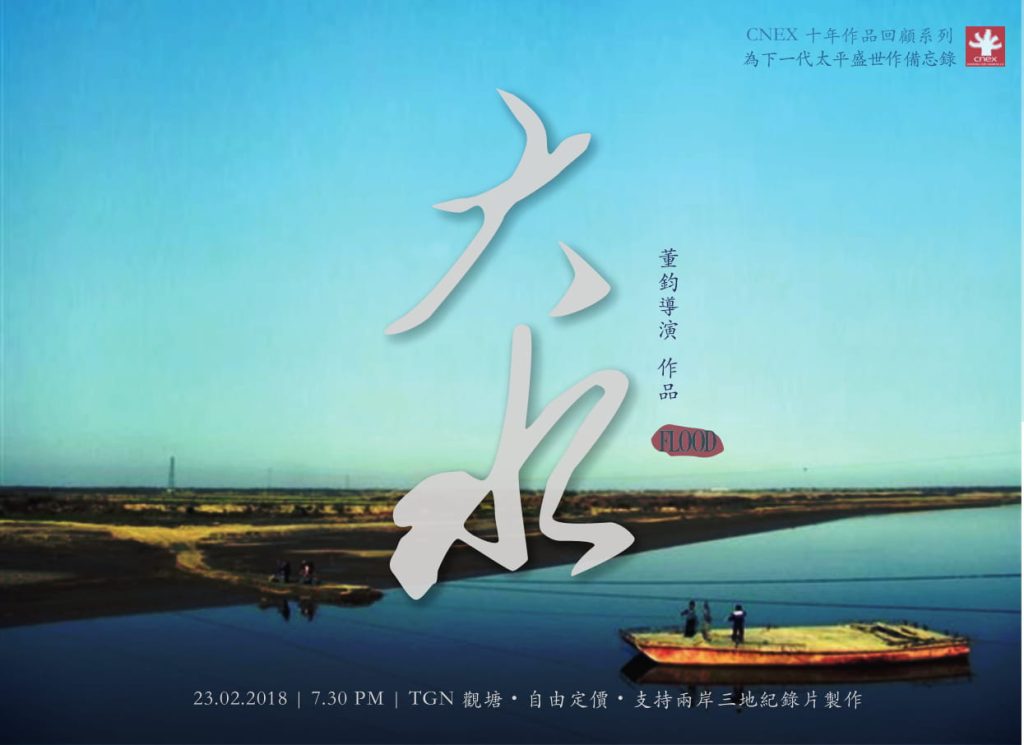
The DayuTemple was built in the Yuan dynasty and located northern of the ZhouyuanVillage, SudongTown, HangchengCity. The legend goes that during the regime by the emperors Yao and Shun, Dayu was assigned with the task of fighting against the flood in the Yellow River region. Dayu was so baffled yet devoted that he had not gone home for 13 years, even when he passed his doorway.
The old ferry port by the river Weihe has been there for years and plays a vital role for the nearby farmers transporting between one bank to the other of the river. However, the construction of the Sanmen Gorge Dam has totally changed the river Weihe to be suspended with sediments while forming an elevated river bed. People no longer see the wax and wane in the life along the river Weihe.
Villagers from Xinyu Village of Dali County chose to cultivate the land along the river bank and live in the areas raised higher above. It’s been forty years since the Sanmen Gorge project was inaugurated. River banks along Yellow River are largely deserted, and the army entered the region aroused conflicts with local farmers, who just want to give their best shot for survival. Tongguan Fort is another place badly influenced by the Sanmen Gorge project. The ancient fort has disappeared as a result of the policy oversight by the government. The water level in the Sanmen reservoir would never have submerged Tongguan Fort, but it has been replaced by the Venice Hotel and Yellow River Fish Barbecue anyway, bringing even less visitors.
MA, Jian-wen is a folk poet from Fengdong Village of Huayin County. He received education up to only senior high school level and was resettled in Qinghai Province. In the 40 years in Qinghai, his senses of responsibility and independent thinking prompted him to accomplish several hundreds of poems, many of which are about the resettlement and life in exile. A trivial grass-root figure like him still insists on his dream to return to his hometown. Fighting against flood has always been the action front of Chinese politicians, and there are always more and more of such water conservancy projects to come. But today, do these political leaders see traps hidden behind the economical development?
March 2018
KJ (2009)
Director : King-wai Cheung

KJ is a 17-year-old music prodigy from a well-to-do family, and lives an inexhaustible life provided by his doctor father. At the age of 11, he won his Best Pianist title at the Hong Kong Interscholastic Competition in Music and the opportunity to play Beethoven’s Concerto for Piano No. 1 with a professional orchestra in Czech. However, in the mind of the young talent, he began to question incessantly about his life, about “why piano?”, and “what is in life, if not music?”
There since, he who is turning 17 this year has not made much substantial achievements in terms of awards and performance opportunities, other than his temporary drop-out for two years. Sometimes, he is not happy … tormented by reflections on a utilitarian reality and more.
This documentary goes deep down to one’s mind: his thoughts, his struggles and his choices. It is a story of a genius, but also a story of everyone, lamenting over our unrecognized talents while brewing one’s dream-come-true. Just as what we do in our daily life…
April 2018
Game Theory (2010)
Director : WANG Qingren

Realizing the importance of knowledge in determining her children’s fate, Zhang Zhi Li decides to leave her two adolescent daughters at her home in the countryside, and with her husband, takes her son to the city in pursuit of an education.
Yang Xiu Qing has brought her only son and daughter from the countryside to the city. In order to make it possible for them to stay there, she has used her late husband’s pension to buy city resident permits, known as “hukous,” for her two children.
Two ordinary families from the countryside, for the fate of the next generation, have left their hometowns for the city, where they begin to seek their dream of a wandering life/begin their wandering life in pursuit of their dreams. However, things do not develop as expected.
The tremendous gap between reality and dreams has left the two families tightly embraced by poverty. Exactly which road should they follow? Should they return to the countryside to start over, or should they take one last stand against fate and stay in the city? Neither choice seems to be very easy…
May 2018
China Gate (2011)
Director : Wang Yang
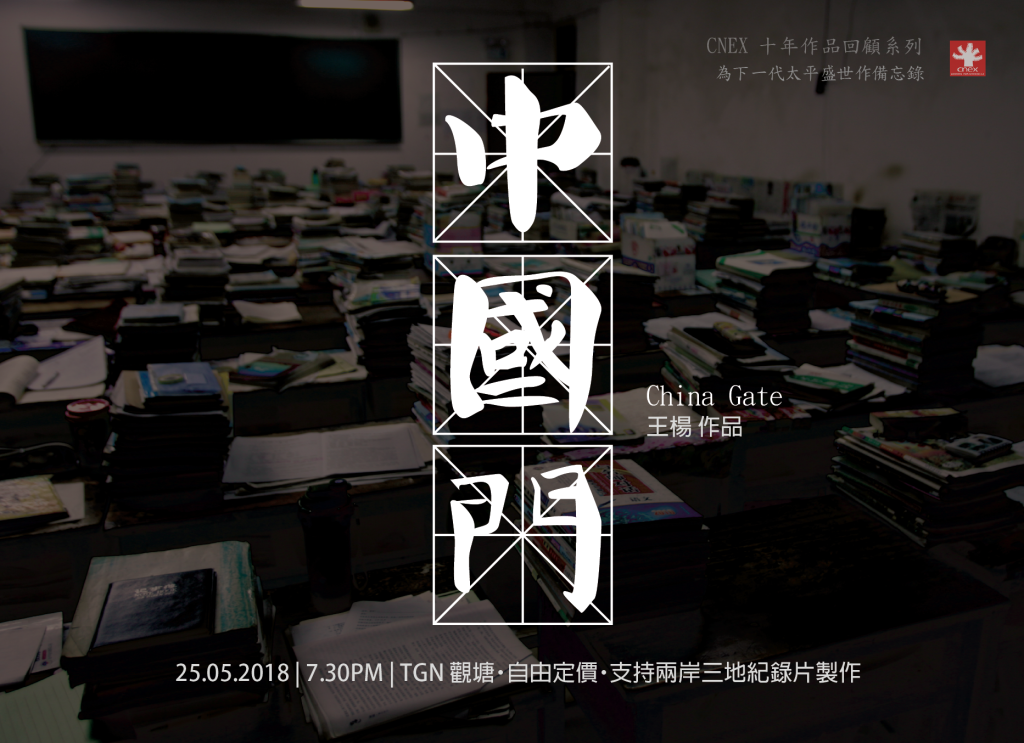
China Gate tells the story of young Chinese fight to change their fate through studying.
Right before dawn, students in Huining have already started their self-studying session; hard working youngsters have filled up the space of school ground. This is one of the most poverty-stricken Counties in Western China; here people’s only hope is in education, as the way to change their social status.
Therefore all their effort point towards the College Entrance Examination, the process is like going through a gate, those who pass can study at urban Universities, and have the chance to build a better life.
June 2018
Dialogue Between Blue & Green (2012)
Director : Fu Yue
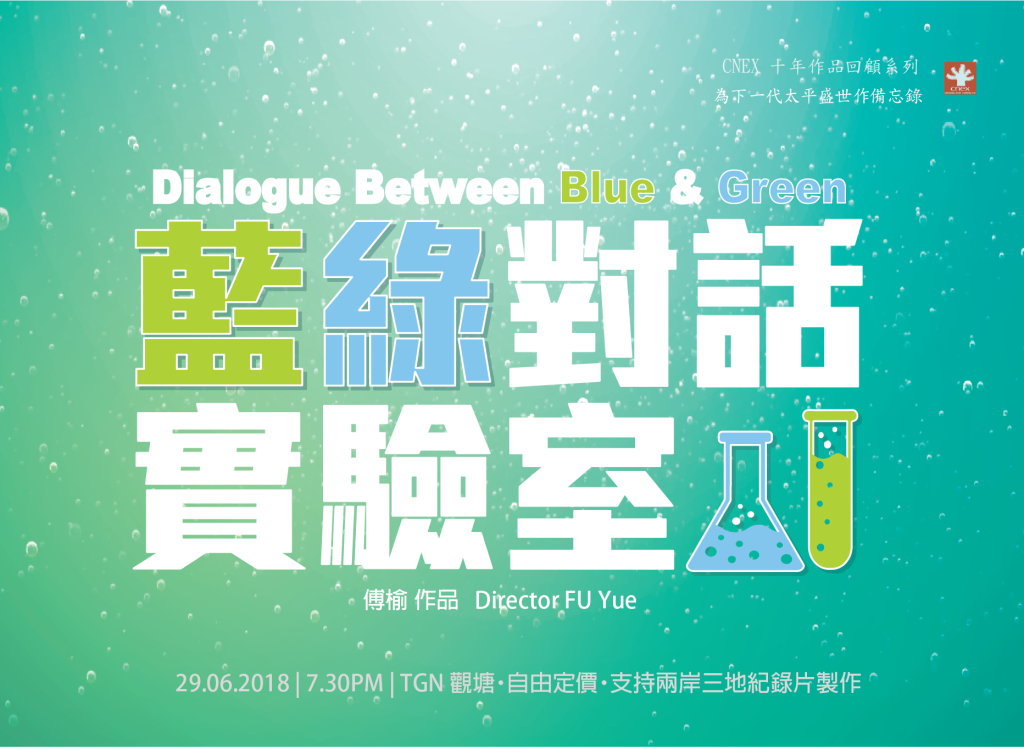
Taiwan’s democracy is the envy of Chinese people all over the world. At the same time, when this two-party system– “blue”(Kuomingtang) and “green”(Democratic Progressive Party)– get at each other’s throats, it seems to cast a dark cloud over this beacon of advancing democratization. How does the young generation, many of them first time voters, feel about the political environment they’ve inherited? Will they allow for their political differences to drive a deeper wedge into the Taiwanese society?
A year and a half before Taiwan’s 2012 Presidential Election I gathered a group of young people from across the blue and green spectrum to participate in a political dialogue. Although they’re from opposing parties, they were willing to talk politics. Through these deliberately arranged dialogues, what sparks will fly?
Through these dialogues, those who belonged to a certain party line began to doubt their decisions; those who were apathetic experienced a political awakening and embraced voting as their civic duty; those who thought they were standing on the side of justice realized they’ve been preaching to the choir; or those who have been paying lip service finally decided to act for the cause they believed in. In addition to this group of young people, we’ve also arranged for representatives from both parties, as well as exchange students from Hong Kong and China to join this debate on Taiwan’s unique democratic environment. How do the varying views contribute to the blue and green young people of Taiwan? We hope this experimental dialogue not only opens up for cross-aisle understanding, but also promotes a reflection on what it means to be blue or green and the value behind casting that one vote.
July 2018
Home School (2013)
Director : Albert J.L. Huang
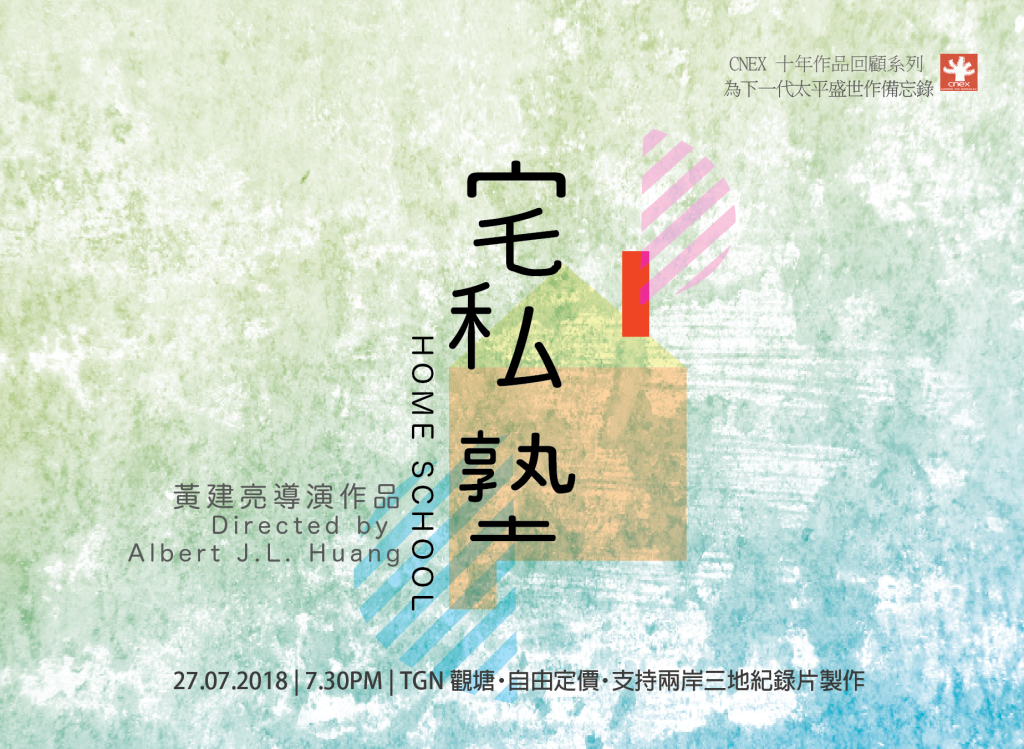
Everyone’s first school is their home. But in Chinese societies where the school system has fully matured, studying at home has become an anomaly. The importance Chinese place on education is well-known, all parents wish their children to achieve great success; but under a group consciousness where testing is at the forefront of education, manipulating teaching materials to create a diversified education program that addresses each student’s aptitude has become an important topic.
This film looks at four different families – the Polish and Taiwanese CHEN-WERNIK family, the traditional ZHAN family, the LUO family, who adjusted to traditional education yet still chose homeschooling, and the MALCOLM family, who had experienced hurdles in school and found solace in a non-traditional school – and examines their backgrounds which led them all to homeschooling, their situations, and their stories.
Taiwan is currently the only Chinese region which has legalized homeschooling, however its undertaking is still hindered by various problems. The four families in the film have all said “No” to the traditional education system and bravely forged their own paths, confronting mainstream education and societal values which have become riddled with disadvantages and difficulties.
Does the desire for your children to grow up happily contradict the desire for them to become successful? What kind of educational environment should we prepare for our children? What kind of people will society need in the future? How should families with different backgrounds and children with different talents select a proper education? What is best for children? All of these questions require long-term observation and experimentation.
We only have one chance at life. Education has an irreversible impact on children and deserves our concerted efforts.
August 2018
Planting for life (2014)
Director : Gu Xiaogang

Some years ago, white-collar worker Lao Jia left metropolitan Shanghai to live on the idyllic Chongming Island. He contracted, more than 200 acres of land, adopting “natural FARMING” to grow crops without using any chemical pesticides or fertilizers. His wife Li Zi, persuaded, followed along to begin a new life surrounded by nature with him.
Problems about food safety are many. Lao Jia had therefore attracted crowds of urban followers for his “back to rural villages” ideal and unique farming concepts. Local farmers disagreed, however. Some said he wasting this country’s food, because he was only growing crops affordable by the wealthy.
Of his followers, many are young volunteers who worked for him in exchange of accommodation. They had all dreamed about a wonderful village life, but were soon disappointed by solitude, which they are not used to, and lack of material pleasure as they arrived on the farm. Hence it was difficult for Lao Jia to train any youngster to be his successor, and he eventually took his wife as his sole farming disciple. They lived and worked closely together, but Li Zi realized at a later stage that, no matter she gave up on a city life to come to this village with her love, her marriage life had become anything but a happy one. The couple no longer supported each other out of romantic love, but shared the work more like just ordinary co-workers. One day, during a fight, they spoke of divorce. Lao Jia’s mother succeeded in persuading them to stay together; they even had a baby afterwards. Then, on another day, Li Zi had a conversation with some old village ladies. She learned that all of them had lived through the hardships she was living through. They raised their children on their own, farmed and worked, and tried hard to keep the family together. Li Zi finally felt peace of mind through this conversation, since most of the village women share the same fate. She started to accept her circumstances.
Just when the child was almost six months old, Li Zi found out that Lao Jia had been secreting dating another woman for the last three years. Lao Jia then left the farm, and Li Zi’s father also died unfortunately. Now that the two most important men in her life had left, it dawned on Li Zi that life is an ongoing journey. There were times when she happily followed Lao Jia on the farm. They planted seeds and seedlings grew. They harvested rice together, but Lao Jiao had long betrayed her when it comes to love.
September 2018
Nineth Uncle (2014)
Director : WU Jian-xin
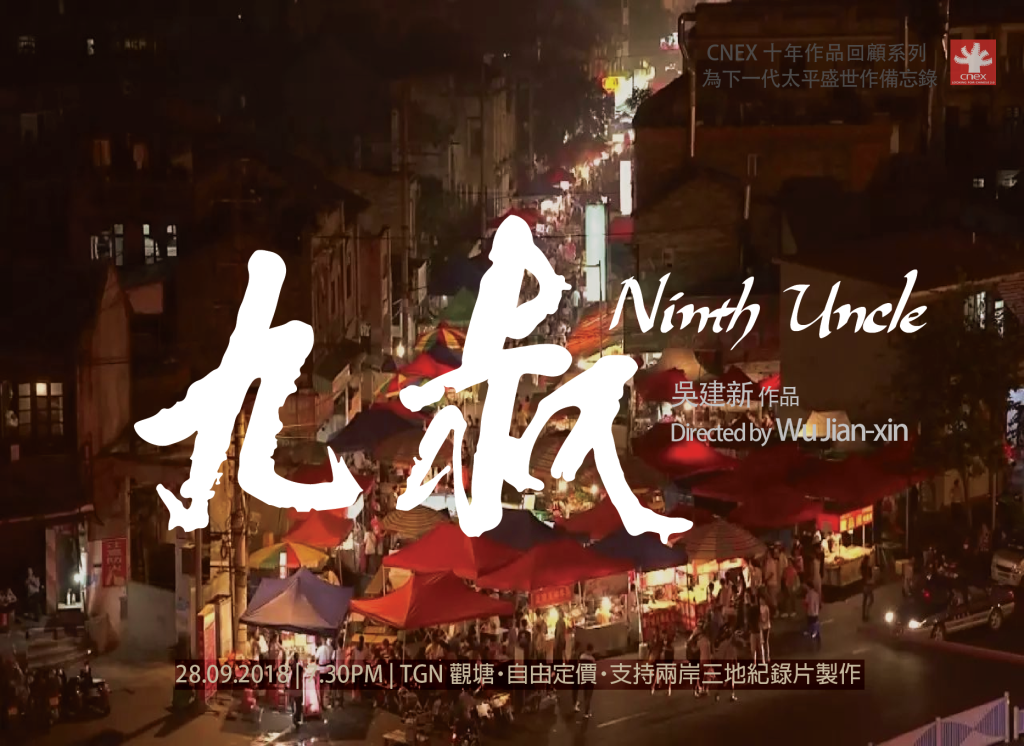
This documentary aims to show the stories of ordinary people on Zhongshan Road represented by night market manager Ninth Uncle, as well as the vicissitudes of life in a changing era.
Ninth Uncle is nicknamed “mayor of the night market.” He has been handling the Zhongshan Road Night Market for 30 years as a contract staff for the government. All kinds of private business owners gather up at the market; some are nice, some are not. Ninth Uncle rules the market with a slightly rough, gangster approach and it works well. With his hard effort, the night market grew from just a few street vendors to a full-fledged 300-stand food plaza. The Zhongshan Road has since been known far and wide for its gourmet food. As the market thrives, the business owners and the city’s district officer show more respect to him. Thus Ninth Uncle’s status is quite high in the area. Although he is almost 70, Ninth Uncle contributes most of his time to the night market. Whenever the night falls, he puts on his work uniform and brings his baton to go for a patrol in the night market with his team, no matter the weather. By midnight, he invites old friends from the market to drink and play card games. Dizzy, they then take a high-profile late night walk through the city.
But the 30-year-old night market is counting its days, because the government will soon “renew” the Zhongshan Road. By then, this night market featuring gourmet food will cease to exist. As demolishment work goes on, the night market loses its customers. Sixth Uncle used to enjoy a great business, but his shop has now been torn down. He can do nothing but to be a street vendor again
with his wife and a few staff. Some old stores announce that they will soon relocate. Ninth Uncle has a night market revival plan in mind, but he can only watch his kingdom decline day by day. The world is not on his side.
The Chinese New Year is drawing near, and a few more facades of the street are being knocked down. But Ninth Uncle is thrilled because neighboring Gonghe Road, now a night market street, is to be managed by him. Ninth Uncle is busy recruiting new managerial staff to keep the street in order and to secure their authority at work. At the same time, all of the private business owners in the night market are also getting ready for the busiest festival of a year.
November 2018
Hip Hop Storm (2010)
Director : Su Che-Hsien
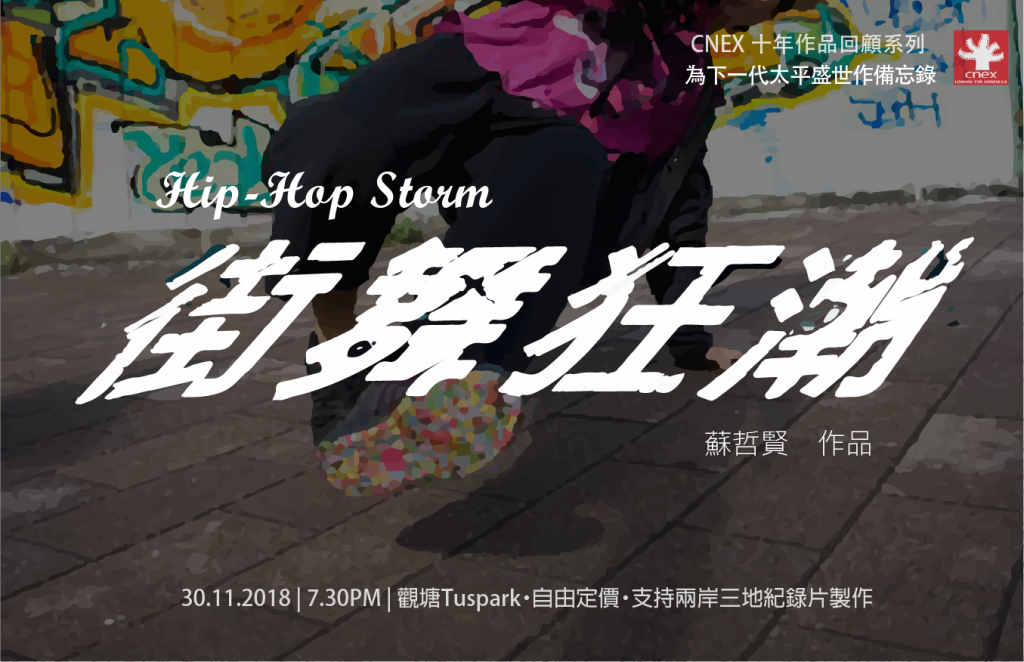
This is a documentary about two generations of hip-hop dancers.
“I’m 34 now and still dancing. Probably I won’t stop until I win,” said Alun. For him, hip-hop is his life, his oxygen. During the 90’s, when Taiwan was just liberated from authoritarian, he formed the first Taiwanese hip-hop group, “The Party”, and released two albums, even though he was subjected to vast pressure from the disagreeing eyes in the society. However, the group was somehow dismissed and the members simply went separate ways. Alun therefore went to Osaka, New York, Europe, Brazil and other places to explore different souls of the dance.
Another line of the story is about a dance group on the street of Taipei called “Eight Children”, which was formed by a group of high school students. They are of the new generation born in the 90’s and they are only about half of Alun’s age. This new generation of hip-hop dancers doesn’t have the pressure from the disagreeing eyes of the society, and in instead, they are fully sponsored by the praise and encouragement to a hip-hop culture.
“Eight Children” agreed one year ago that after this year’s college entrance examination, they would come back and take part in the upcoming hip-hop competition. Will they have a happy ending? Or, who cares? Hip-hop needs not to be serious. All in all, just keep dancing!
December 2018
Young Jigme (2014)
Director :Liu Cuilan

There are two roads in the woods.
You can only take one of them,
and wonder about the other for the rest of your life.
Longwu is a temple of no more than 20 monks. When 17-year-old Jigme became a junior monk there, he had no idea whether it was better to renounce or to join the secular world. The temple sits quietly within the depths of a mountain. It is far away from the bustles and hustles of about a dozen surrounding villages. But, on all occasions related to people’s births and deaths, the monks are invited by villagers to hold solemn chanting sessions to help the souls of their loved ones enter or leave this world. For a young monk like him, frequent visits to the villages make it much harder to practice Buddhism and live in solitude. It could even have been easier to practice it in a fully secular environment. In fact, since Jigme has joined the temple, half of the monks have already left for various reasons and have each found a spot for themselves in the secular world. Hence, from time to time, Jigme wonders, “Must I chant sutras day after day? Or is there a more meaningful way of life?”
During the rainy season of a year, all things grow, and all Buddhist monks stay in their temples to practice Buddhism. This year, with only eleven monks left, there are not enough junior monks to officially receive the precepts during the summer recluse. The temple seniors decide to have three young monks to do this. Jigme is fully aware what this means to him – He has read the 253 precepts. He used to think that monks had the right to take off their Buddhist garments and return to their secular homes, but now, he realizes that once a monk receives his precepts, unless being expelled by his temples, he has an overbearing obligation to stay. Conflicted, he doesn’t know which path is better. Once he makes a step, there is no return. Realizing this, he patiently waits for an answer to dawn on him. During the dark of night, Jigme takes out the long roll of sutra that he reads every day, and cleans it carefully by a flickering lamp.
This summer, Jigme has come to the crossroads of life. Of the two roads out there, he can only choose one.












